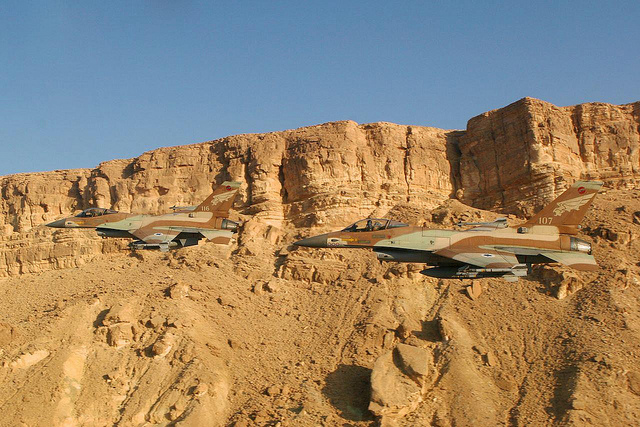Russian ambitions are turning Syria into a potential battle zone for Israel and Iran

On 10 February, the world woke up to the news that Israeli fighter jets had hit Iranian targets in Syria. The altercation highlights the dangerous game that Russia is now playing in the eastern Mediterranean.
The Israeli strikes came in response to an Iranian drone, launched from an airfield near Palmyra, that infiltrated Israel for 90 seconds. Israel responded with a ‘large-scale strike’ against four Iranian and eight Syrian targets in Syria. The attack destroyed aerial defence batteries, a Syrian radar installation and the trailer from which the drone had been launched. The Assad regime responded to the incursion with its Russian SA5 and SA17 anti-aircraft batteries, shooting down an Israeli F-16 fighter, which crashed in northern Israel after its pilots ejected.
Russia has strong relations with Iran and Syria, but at the same time Jerusalem and Moscow are improving their relations. Moscow sees enormous strategic value in working with one of the world’s premier ‘start-up’ nations. Israel offers Russia much, starting with around a million Russian-speaking Israelis (at least three Israeli government ministers speak fluent Russian), and people can travel very easily between the two countries. Moreover, President Vladimir Putin has capitalised on the strained relationship that existed between Israeli Prime Minister Benjamin Netanyahu and Barack Obama to improve relations with Israel. Netanyahu seems to appreciate the Russians’ pragmatic stance. Additionally, Israelis recognise Russia’s growing presence in, and rising influence across, the eastern Mediterranean, making Russia invaluable to Israeli security.
Israel recognises that the key to its security lies in persuading Putin to limit Iranian adventurism. It expects that, with the defeat of Islamic State, the Iranian presence will increase, posing a clear and present danger to Israel.
Two weeks ago, Netanyahu travelled to Moscow, where he allegedly informed Putin that Israel views the Iranian presence in Syria with the ‘utmost gravity’ and will ‘act according to need’ to curtail the threat. Netanyahu reportedly asked Putin to exert pressure on Iran to remove 70,000 long-range missiles that it has placed in Syria.
Soon after the drone incursion, Israel appealed to Moscow to help defuse the situation, leading to a terse statement from the Kremlin calling for ‘restraint’, linking that call to the need to ensure that Russian troops in Syria aren’t affected. That theme appears continually in Israeli–Russian discussions, as the Israelis are conscious of the high number of Russian troops and advisers in the country and recognise that they can’t afford to cause Russian fatalities.
That Jerusalem turned to Moscow underscores the influence that Russia wields in the region. In contrast, there was no expectation of any American action beyond a simple appeal for calm. Israeli policymakers recognise that the real power brokers in Syria are the Russians and the Iranians, and they hope that Moscow can restrain Tehran.
For Israel, Syria is becoming an existential threat. In early February, Netanyahu and his defence minister visited Israel’s northern border. That night, Israel launched an aircraft attack on a factory making precision missiles on the outskirts of Damascus.
An Israeli Air Force commander admitted that Israel had carried out thousands of missions in Syria in the past year, highlighting Israel’s growing concern about Iran’s presence. This could also explain why Israel announced early this month that it intends to carry out a major military exercise involving its paratroop brigade in mid-2018. The exercise will include the use of heavy weapons and Israel’s C-130J Hercules transport aircraft. Israel’s hawkish Defense Minister, Avigdor Lieberman, recently said: ‘I can state clearly from our side that we are determined to prevent Iran from gaining a foothold in Syria.’
Israeli policymakers look to Lebanon, where Hezbollah has a chokehold on the country. They’re fearful that Syria, too, will become a vassal state of Iran unless they undermine the Assad regime.
Israel has limited options vis-à-vis Syria because of Russian ambitions and the lack of American leadership in the region, coupled with concern that Assad’s removal could turn Syria into another Somalia. That could attract the 3,000 or so Islamic State fighters currently hiding in the desert in the Iraq–Syria–Jordan border area.
The Israelis can continue with strategic strikes to slow down Iranian encroachments, inflicting casualties on the Iranians in the hope of causing further domestic instability in Iran, or they can work with other regional actors, mainly Saudi Arabia and Egypt, to challenge Iranian ambitions (Turkey is no longer a reliable ally, at least from Israel’s perspective).
However, as long as Putin continues to believe that he can negotiate a careful balance in Syria and with Iran that allows Russia to maintain a strong foothold in the Mediterranean without pushing the region into a major conflict, Israel’s long-term options remain limited. Therefore, the challenge for Israeli policymakers is to convince Putin that his activities in Syria are narrowing Israeli options.
